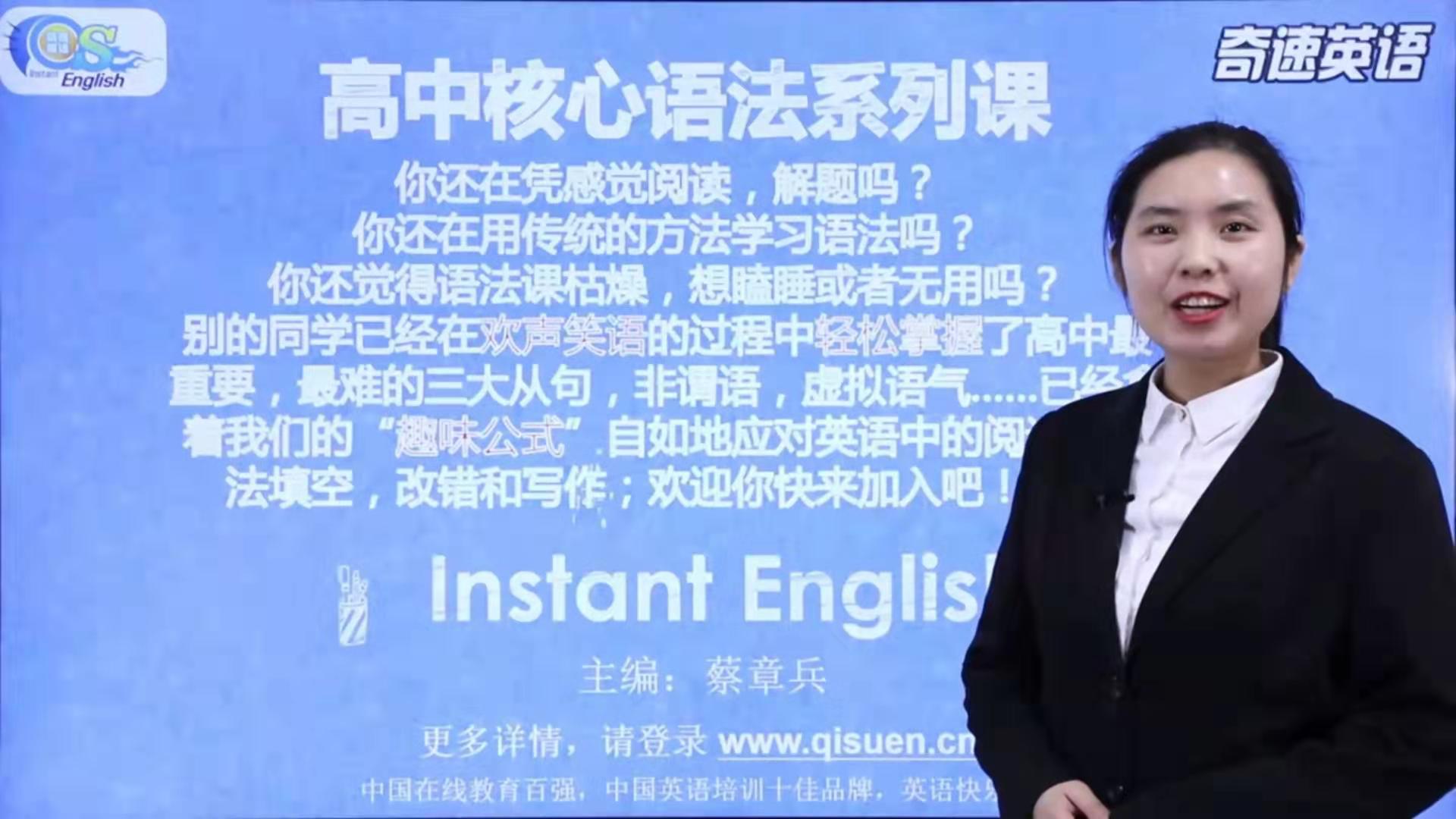-
山东济南最火如何挑选英语加盟培训机构,高端英语教育品牌,在线学英语哪个好
2020-04-16
-
安徽合肥在线英语品牌加盟,奇速英语优课智能英语家教每天仅需一元钱!
2020-04-16
-
2020-04-16
-
2020-04-16
-
2020-04-16
更新时间:2020-04-16浏览:次评论: 条
山东济南最火如何挑选英语加盟培训机构,高端英语教育品牌,在线学英语哪个好
2020-04-16
安徽合肥在线英语品牌加盟,奇速英语优课智能英语家教每天仅需一元钱!
2020-04-16
2020-04-16
2020-04-16
2020-04-16
状语从句是初中英语学习的重点,也是每年中考必考的内容之一。
中考主要考查引导状语从句的连词、从句时态等方面。重点考查时间状语从句、条件状语从句、结果状语从句和比较状语从句。
接下来我们就针对这四种从句的考查要点和连词的使用进行系统总结。
今天小编主要给大家准备了时间状语从句讲解,同学们可以收藏起来认真体会学习,也可以转发分享给更多需要的朋友。
.jpg)
状语:状语是句子的重要修饰成分。
状语是谓语里的另一个附加成分,它附加在谓语中心语的前面,从情况,时间,处所,方式,条件,对象,肯定,否定,范围和程度等方面对谓语中心进行修饰或限制。用来说明地点、时间、原因、目的、结果、条件、方向、程度、方式和伴随状况等。
状语一般由副词、介词短语、分词和分词短语、不定式或相当于副词的词或短语来担当。其位置一般放在句末,但也可放在句首或句中。
副词是一种用来修饰动词,形容词,副词或全句的词,说明时间,地点,程度,方式等概念。
1.副词一般在句子中做状语.
He speaks English very well.
他英语说得非常好.(中的very是程度副词,用来修饰well。very well是修饰speak的程度状语)
He is playing under the tree.
他在树下玩儿.(under the tree是地点状语.)
2. 不定式在句子中可以作目的状语。
I come specially to see you.
我专门来看你.
3.介词短语
Ten years ago, She began to live in Dalian.
The boy was praised for his bravery.
4.从句作状语
When she was 12 years old, she began to live in Dalian.
If I am not busy tomorrow, I will play football with you.
5.分词作状语
Having had a quarrel with his wife, he left home in a bad temper.
Inhibited in one direction, it now seems that the Mississippi is about to take another.
在复合句中,由时间连接词引导的状语从句叫做时间状语从句。
时间状语从句通常由when, while, as,after,before,since,until等词引导。引导时间状语从句的连词很多,为更于理解,可分为以下三类:
1. 普通连词如after, as, before, since, till, until, when, while等。
I will tell you after they leave.他们走我再告诉你。
He dropped the glass as he stood up.他站起来时,把杯子摔了。
I’d better have a think before I decide.我最好还是先想想再作决定。
We have known each other since we were children.我们从小就认识。
He waited until she was about to leave.他等着一直到她准备离开。
Shut the door after you when you go out.出去时请随手关门。
Stand still while I take your photograph.我给你拍照时站着不要动。
2. 表示“一……就”的连词表示“一……就”的时间连词除as soon as外,还有the moment, the minute, the second, the instant, immediately, directly, instantly, once, no sooner…than, hardly…when等。
He started as soon as he received the news.他一接到消息就出发了。
The moment I saw him I knew there was no hope.我一看到他就知道没希望了。
I want to see him the minute (that) he arrives.他一来到我就要见他。
The instant he opened the door he saw the thief.他一开门就看见了这个贼。
Immediately he came I told him the news.他一来我就把消息告诉了他。
Once he arrives, we can start.他一来我们就可以开始。
We had no sooner set out than it began to rain.我们刚出发就下雨了。
She had hardly arrived when it began to snow.她刚到就下起雪来了。
3. 含有time的连词这类连词主要有every time(每次),each time(每次),(the) next time(下次),any time(随时),(the) last time(上次),the first time(第一次), by the time(当……的时候)。
You can call me any time you want to.你随时都可以给我打电话。
Each time I went there, I saw him working.我每次去那儿都看见他在工作。
Every time I see her I'll think of it.每次我看到她,我就想起这事。
Next time you come in, please close the door.下次你进来,请关门。
He didn't tell me the last time I saw him.我上次见到他时他没告诉我。
The first time I heard about the firm closing down was when George told me.我最初听到公司倒闭的消息是乔治告诉我的。
By the time he was taken to the hospital he was nearly dead.他被送到医院时已经几乎不行了。
注意:every time, each time, any time前不用冠词,(the) next time, (the) last time中的冠词可以省略,而the first time中的冠词通常不能省略。when, while 和 as 引导时间状语从句的用法
一、when 的用法如果只从现象来看,when 从句用的最多的是一般过去时,而主句的时态没有限制,根据具体情况而定。
1. When he was a child he was always trying out new ideas.他小时候就常常试验一些新的设想。
2. When she came into my room, I was just reading a book.她走进我房间时,我正在看书。
3. Were you writing when the teacher came in?老师进来的时候,你在写信吗?
4. Sorry, I was out when you called me.对不起,你打电话来的时候我出去了。
5. He was on the point of leaving when someone knocked at the door.他正要走,这时有人敲门。
6. I thought of it just when you opened your mouth.就在你要说话的时候,我也想到了。
根据以上的例句,我们可以总结出一点:when 从句的A事件,相当于另一个事件B发生的时间点。也就是说,when 从句的重点不在动作本身发生的状态,而只是把它作为一个时间点,所以when 多数情况下用的是一般过去时,则不用正在进行时。因为如果用正在进行时,它表示的就是一段时间而不是一个时间点了。
根据这一点,有的文章补充说:when 从句的动词大多是瞬时动词。这种说法也可以参照。实际上,when 从句也可以有其它的时态,但几乎也不用进行时,因为它也只是作为一个时间参照点。:
1. When I got to the airport, the guests had left.当我赶到飞机场时,客人们已经离开了。
2. When he had finished his homework, he took a short rest.当他完成作业后,他休息了一会儿。
3. Why do you want a new job when you have got such a good one already?你已经找到如此好的工作,为何还想再找新的?
4. You shall borrow the book when I have finished reading it.在我读完这本书后,你可以借阅。
二、while 的用法相比于when 来说,while 从句的侧重点就不一样了。
while 从句的侧重点在于描述动作正在发生的状态,它的意思是:当while 事件正在发生的时候,另一件事如何如何。所以,while 从句一般用的是正在进行时。而另一件事的状态没有硬性的要求,根据具体情况而定。
1. While my wife was reading the newspaper, I was watching TV.当妻子正在看报纸的时候,我正在看电视。
2. While Jim was mending his bike, Lin Tao came to see him.正当吉姆修自行车时,林涛来看他。
3. While they were talking, the bell rang.正在他们谈话的时候,上课铃响了。
4. You can’t do your homework while you’re watching TV.你不能一边看电视一边做家庭作业。
5. While John was sitting biting his nails, I was working out a plan to get us home. 约翰坐在那里咬指甲时,我正在制定一个回家的计划。
从时间的角度来看,while 表示的是一段时间,是一个过程。这是while 的侧重点。因此,如果含有“一段时间”的含义的时候,就可以用while。
6. Strike while the iron is hot.趁热打铁。这句话中,是说趁着铁是热的这段时间,赶紧打铁。如果换成 when 意思就变了,相当于说铁只热了一下,打一下,然后铁就冷了。这显然不符合文意。I'm going to the post office.While you're there, can you get me some stamps?
三、as 的用法as 从句表示的也是一件事情正在发生,另一件事也正在进行当中。但与 while 从句不同的是,as 从句用的一般不用正在进行时,而只是一般过去时。as 从句一般可以翻译成“边……边……”。
1. As my mother sang those old songs, tears ran down her cheeks.当我妈妈唱起那些老歌时,眼泪顺着她的脸颊流了下来。
2. The students took notes as they listened. 学生们边听课边做笔记。
3. As we talked on, he got more and more excited.我们继续往下谈的时候,他越来越兴奋。
4. The little girls sang as they went. 小姑娘们一边走,一边唱。as 表达的事件,往往只是主句动作发生的背景或条件时,as 只是一个次要的时间说明,不像while 从句有强调 while 动作本身的意思。因此,as 常常翻译成“随着……”之意。
1. As the time went on,the weather got worse.随着时间的推移,气候更加糟糕。
2. The atmosphere gets thinner and thinner as the height increases.随着高度的增加,大气越来越稀薄。
3. As years go by,China is getting stronger and richer.随着时间一年一年过去,中国变得越来越富强了。
when, while, as 的互换如果从句动作和主句动作同时发生,并且从句动作为延续性动词时,when,while,as 可以互换使用。
1. When /While /As we were dancing, a stranger came in.当我们跳舞时,一位陌生人走了进来。 (dance 为延续性动词)
2. When /While /As she was making a phone call, I was writing a letter.当她在打电话时,我正在写信。[make为延续性动词]
3. While/When/ As I was walking down the street, I noticed a police car in front of the bank.我顺着马路往前走时,发现银行门前停着一辆警车。
比较while, when, as1)as, when 引导短暂性动作的动词。Just as / Just when / When I stopped my car, a man came up to me.我刹车后,有一个人向我走来。2)当从句的动作发生于主句动作之前,只能用when 引导这个从句,不可用as 或 while。When you have finished your work, you may have a rest.干完活后,你可以休息一下。3)从句表示“随时间推移”连词能用as,不用when 或while。As the day went on, the weather got worse.日子一天天过去,天气越变越坏。before和after引导的时间状语从句
1.before是主句动作发生在从句的前面。注意before引导的从句不再用否定式的谓语,并且当before引导的从句位于主句之后,有时译成“就,才”。还要注意主句和从句之间的时间关系。当主句用将来时,从句总是用现在时;如果before引导的从句谓语用的是过去时,则主句动词多用过去完成时,这样以便体现动作发生的先后。
2.After表示主句动作发生在从句动作之后。主句和从句的动作的时间关系正好与before引导的从句相反。It will be four days before they come back.他们要过四天才能回来。
Einstein almost knocked me down before he saw me.爱因斯坦几乎把我撞倒才看到我。My father had left for Canada just before the letter arrived.我父亲恰好在信到之前去加拿大了。They had not been married four months before they were divorced.他们结婚还不到四个月就离婚了。After you think it over, please let me know what you decide.你仔细考虑过以后,告诉我你是怎样决定的。After we had finished the work, we went home.完成工作之后,我们回家了。(从句用过去完成时,主句用一般过去时)比较until和till的用法
此两个连词意义相同。肯定形式表示的意思是“做某事直至某时”,动词必须是延续性的。否定形式表达的意思是“直至某时才做某事”。动词为延续性或非延续性都可以。
正确使用这两个连词的关键之一就在于判断句中的动词该用肯定式还是否定式。肯定句:I slept until midnight. 我一直睡到半夜时醒了。Wait till I call you. 等着我叫你。(在肯定句中可用before代替。
例如:Let's get in the wheat before the sun sets.) 否定句:She didn't arrive until 6 o'clock. 她直到6点才到。
Don't get off the bus until it has stopped. 公共汽车停稳后再下车。
I didn't manage to do it until you had explained how.直到你教我后,我才会做。
区别:1)until可用于句首,而till通常不用于句首。Until you told me, I had heard nothing of what happened.直到你告诉我以前,出了什么事我一点也不知道。2)until when 疑问句中,until要放在句首。Until when are you staying?Until next Monday.你呆到什么时候?呆到下周一。注意:否定句可用另外两种句式表示。3)Not until…在句首,主句用倒装。Not until the early years of the 19th century did man know what heat is.直到19 世纪初,人类才知道热为何物。Not until I began to work did I realize how much time I had wasted.直到工作,才认识到我已蹉跎了许多岁月。4)It is not until… that….It was not until I began to work that I realized how much time I had wasted.巧辨before和until
在日常英语教学中,我们遇到学生问这样的一些问题:
1.He will spend six hours at his desk____he finishes his composition.
A.before B.until C.after D.when
2.The bike hit the tree____I could get off.
A.when B.before C.while D.until
3.I knocked at the door for more than five minutes____Mrs white answered it.
A.until B.when C.after D.before
4.It was____yesterday____be____the secret.
A.not until;that;knew B.until;when;knewC.not before;that;found D.before;that;didn't find怎样才能清楚地解释其选择的原因,这就涉及到until与before的区别问题。实际上,只要我们把握住两者使用时本身的含义及主句动词是终止性的,还是延续性的,肯定式,还是否定式两大点,就能容易地解决这类问题。现详细阐明如下:一、在下列情况下,两者可互换用,但含义略有不同。
before表示“在……之前”的意思,强 调时间先后关系;而until表示“直到……才”的意思,主句是肯定句则表示主句动作的终止时间;主句是否定句则强调主句动作的起始时间。
1.主句为否定式终止性谓语动词。常见的动词open,start,leave,arrive,finish, stop等。
(1)The noise of the street didn't stop until/before it was midnight.
(2)The children won't come back until/before it is dark.
(3)I didn't leave the lovely boy until/before his mother came home.
2.主句为肯定式、延续性谓语词,这类动词用stand,stay,talk,be,wait等。
(1)He lived with his parents until/before he graduated from school.
(2)I will wait until/before he comes to my help.
(3)I shall stay heer until/before you come back
.二、在下列情况下,用before不用until。
1.主句这肯定式、终止性谓语动词,只用before。
(1)He fell asleep before I could take off his clothes.
(2)We arrived there before it atarted to rain.
(3)The holiday came to the end befor I knew it.
(4)He almost knocked me down before he saw me.
2.主句谓语动词强调动词的迟缓性,只用before,常伴有时间段状语或时间段暗示。
(1)It was quite some time before he found the elephant at all.
(2)We had walked a long way before we found some water.
(3)We had sailed for two days before we saw the land.
(4)The fire lasted about four hours before the firefighters could countrol it.
(5)It was midnight before my brother came home.
3.如果强调从句谓语动作未发生,就发生主句谓语动作,只用before。常译为“未及”,“不”或“不等……就”。
(1)We can leave early in the morning before it gets too hot.
(2)I must write it down before I forget it.
(3)We do want to buy something now before prices go up.
4.表“与其说……倒不如”,“与其……毋宁……”只用before。
(1)I would give up my job before I'd agree to be dismissed.
(2)He will die of hunger before he will steal.
5.在某些特定句型中用before。
(1)It was not long before the whole country rose up.
(2)It will probably not be long before they understand each other.
三、下列情况一般区别用until1.主句是持续性谓语动词时,肯定、否定都可以,但意义完全不同。肯定表动作终止,而否定表动作开始。
(1)We discussed the problem until/before he came back.我们一直讨论到他回来。
(2)We didn't discuss the problem until he came back.我们一直等到他回来后才讨论问题。
2.not…until句型尽管在某些情况下可与before互换用,但在强调句中一般仍用until。
(1)It was not until he told me that I knew it.(2)It was not until he finished his homework that he went home.综上所述,前面的4条选择题中,第1、3题强调动作发生的迟缓性应选before。第2题表动作未及发生就发生主句动作也应选before。第4题为强调句应选A项。其他时间状语从句的用法
1.由since引导的时间状语从句。since引导的从句的谓语动词可以是延续性的动词,又可以是瞬时动词。一般情况下,从句谓语动词用一般过去时,而主句的谓语动词用现在完成时。但在It is +时间+since从句的句型中,主句多用一般现在时。I have been in Beijing since you left. 自从你离开以来,我一直在北京了。Where have you been since I last saw you?自上次我和你见面以后,你到哪里去了?It is four years since my sister lived in Beijing. 我妹妹不在北京住有四年了。知识扩展It is since从......以来多长时间了(因为since +从句或名词,表示一段时间)It is five years since we met last time.从我们上次见面已经五年了。It is +before(......才)It was a long time before I went to sleep again. 过了很长时间我才睡着。It was an hour before(=until) the police arrived. 过了一个小时,警察才来。
2.由as soon as, immediately, directly, instantly, the moment, the instant, the minute, 等引导的时间状语从句,这些连词都表示“一......就”。I will go there directly I have finished my breakfast.吃完早饭,我立即到那里去。The moment I heard the news, I hastened to the spot.我一听到消息,马上赶到了出事地点。As soon as I reach Canada, I will ring you up.我一到加拿大,就给你来电话。3.由by the time引导的时间状语从句。注意时态的变化:在一般情况下,如果从句的谓语动词用一般过去时,主句的谓语动词用过去完成时;如果主句的谓语动词用一般现在时,主句的谓语动词用将来完成时。By the time you came back, I had finished this book.到你回来时,我已经写完这本书了。By the time you come here tomorrow, I will have finished this work.你明天来这儿的时候,我将已经完成此工作了。时态问题
在状语从句中,有“主将从现”的规定,即主句用一般将来时,从句用一般现在时表示将来时。注意:when 、while 、as 、after、 before、 as soon as、 since、 till /until 、by the time 在时间状语从句中,要注意时态一致。一般情况下主句是将来时的时候,从句要用一般现在时。I will call you as soon as I arrive in Beijing. 我到北京就将给你打电话。(这是由as soon as引导的时间状语从句,从句中的谓语动词arrive是一般现在时,表示一般将来时,决不可用will arrive)




































为什么说中高考英语逆袭仅需30篇文章就能达到涨分10分以上的效果? (1)这30篇阅读文章近乎涵盖了初中1600/高中3500个大纲要求
发布时间:2020-04-16 浏览:81次 评论:条
今晚20点蔡章兵教授 第二场腾讯公益直播开始预定 直播主题 学会这几招终生受益 英语阅读如同看中文一样轻松 (适合中小学师生及家
发布时间:2020-04-03 浏览:178次 评论:条
要想招生好服务就要好,招生模式也要好,更要定好招生战略,还要形成品牌影响力,也要有好的教师团队......看到这种只想说一句,
发布时间:2020-04-03 浏览:176次 评论:条
奇速英语为何涨分快?奇速英语秋季在线直播课有何特色?奇速英语作为中国英语培训十佳品牌、中国在线教育百强品牌、CCTV全国中小
发布时间:2020-04-01 浏览:269次 评论:条
Unit 2单词 (音标) 1. France n. 法国 2. French adj. 法国的 3. flag n. 旗帜 4. wine n. 葡萄酒 5. tick v. 标记号;打上钩
发布时间:2020-03-26 浏览:151次 评论:条